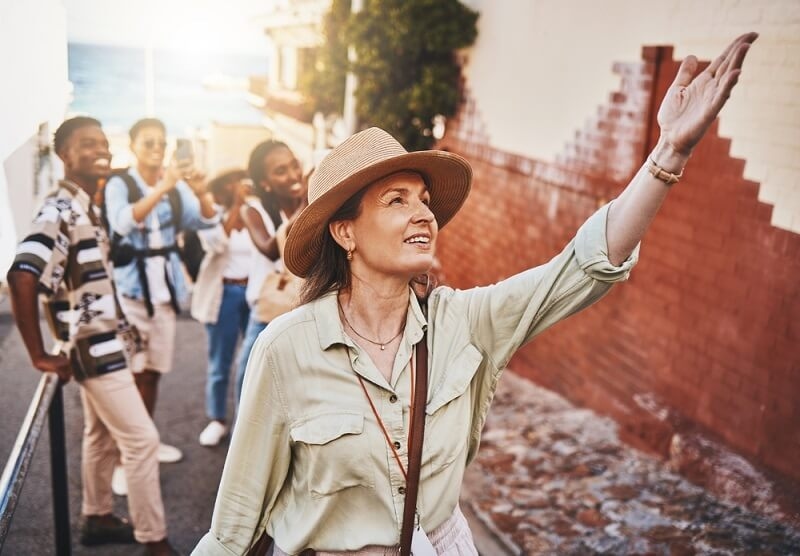
Traveling to unknown locations offers a world of opportunities to discover new cultures, landscapes, and forms of living. However, underneath a beautiful photo-op is a living, breathing community full of people who live there. Unfortunately, even well-meaning tourists can sometimes disrupt the experienced flow of life the local community is trying to enjoy. That's why it's even more important to understand what locals wish tourists knew before visiting their town.
Whether planning a cross-country road trip or spending a weekend in an old historic town, respecting local customs and practicing mindful travel can make all the difference for you and the local community you visit. In this guide, we will explore what locals would like tourists to know, share some timely travel suggestions made by locals, and offer some helpful ways of visiting respectfully, no matter where you are.
Locals often say the first thing they wish tourists remembered is that they’re guests in either a busy city or a sleepy coastal town. Locals want travelers to realize that their home is not a theme park but a place of residence, work, and family. Sometimes it is as simple as recognizing that the mental jump from visitor to guest is a cornerstone of all respectful travel.
Travel Tip: Before your visit, please be sure to invest some time in learning the values, history, and style of life in the town. A small-town farmer's market operates differently than a city square, and you can demonstrate your maturity and respect for those differences by adjusting your behavior.
The first unwritten rule of local travel etiquette is observation. Tourists are all too eager to jump in, not pausing to notice how the local traditions or interactions work. This can happen when entering a public square, attending a community festival, or visiting a local shop. It is simply courteous to observe without participating first.
What Locals Want Tourists to Know: Do not treat cultural rituals, religious practices, or local events as entertainment. You can only participate when invited, or if you are confident that your participation would not interrupt the experience for others.
When tourists become excited, it is common for them to raise their voices, laugh, or act in a way that could disrupt the peaceful flow of a neighborhood. What is acceptable behavior in a party destination is, in many cases, an invasion of personal space in sleepy towns.
Local Customs USA Tip: In residential areas or rural towns, simply lowering your voice and acting calmly publicly is shown respect. Locals appreciate it when tourists blend in and do not stand out unnecessarily.
Big box retailers and national chains are everywhere, but visiting someone else's hometown is a good opportunity to go local. From cafes to bookstores, farmers markets, and handmade goods, small businesses usually, officially, express the heart and soul of a community.
Travel Tips from Locals: Ask locals where they go for lunch or coffee. You will enjoy more authentic experiences and help contribute directly to the local economy. Locals notice and appreciate when you use your money in ways that benefit them.
Every town or region has its customs. In some places, making eye contact and saying hello is expected. In others, people prefer more personal space and limited small talk. Knowing what’s considered polite or rude can prevent awkward interactions.
What Locals Wish Tourists Knew: For example, greetings and pleasantries are a norm in the American South, while in parts of the Northeast, people value efficiency and directness. Please make sure to tailor your behavior accordingly.
While bringing home “souvenirs” like beach stones, wildflowers, or local sand is tempting, these small actions can have lasting effects on fragile ecosystems or cultural sites. Locals often express frustration at tourists who unintentionally damage or deplete the natural beauty that makes their town special.
Visiting respectfully means sticking to marked trails, not littering, and never removing anything from natural or historical sites. These places aren't just scenic—they're sacred to the people there.

Many travelers love candid street photography, but locals often find it invasive. Imagine relaxing on your porch only to realize you're in the background of someone's social media post.
What Locals Want Tourists to Know: Always ask for permission before taking photos of people, especially children or elders. Avoid photographing private homes, even if they look “quaint” or “historic.” Being considerate with your camera is a key aspect of local travel etiquette.
In recent years, overtourism has significantly strained small towns and scenic areas. Streets jammed with traffic, overflowing trash bins, and fully booked restaurants can make locals feel overwhelmed.
Travel Tips from Locals: Try visiting during off-peak seasons or weekdays. Could you look at the posted signage about capacity limits or restricted access? If an area seems crowded, could you find an alternative or wait for it to clear?
One of the most common complaints from locals is when tourists wander onto private property for a better view or photo. Even if a space seems open or picturesque, it may still be someone's backyard.
Best Practice for Visiting Respectfully: Stick to public areas and always look for signs indicating whether a place is open. Please ask a local business owner or staff member if you have any questions.
Tourists often want to "experience the culture," but sometimes that leads to disrespectful behavior, like wearing ceremonial attire as a costume or mocking accents. Cultural sensitivity is not just important—it’s necessary.
What Locals Wish Tourists Knew: Just because something looks fun or different doesn’t mean it’s meant for you to imitate. Take the time to understand the significance behind cultural elements before participating.
From beach towns to mountain retreats, nothing frustrates locals more than tourists who ignore parking rules or block driveways. A few minutes of poor planning on your part can inconvenience a resident for hours.
Local Customs USA Reminder: Don’t assume that just because a spot looks empty, it’s free to use. Check signage, avoid parking in residential zones without permission, and never double-park in narrow streets.
Tourist-heavy towns often rely on seasonal workers and service industry staff who manage enormous crowds during peak seasons. Unfortunately, they’re also the ones who usually bear the brunt of tourist entitlement.
What Locals Want Tourists to Know: A little patience and a generous tip go a long way. Acknowledge the efforts of those serving you—they're not just employees but often locals supporting their families.
It might be hot outside, but that doesn’t mean a swimsuit is appropriate attire for every setting. Dress codes vary based on a town's cultural, religious, or aesthetic values.
Local Travel Etiquette Tip: In beach towns, cover-ups are expected in stores and restaurants. In conservative areas, modest clothing may be preferred. Aim to respect the norms wherever you are.
Respectful tourism is not about a series of strict rules but rather awareness and empathy. When you enter someone else's town, you are stepping into their life, history, and culture. By thinking through what we wish tourists knew before visiting our village, you can become much more than a tourist; you can become a conscientious traveler.
Whether navigating local customs within the USA, using the travel tips of locals, or merely being conscious of your impact, the ultimate goal is to connect with the community, not the place.
So, next time you arrive at your destination, remember: the most impactful souvenirs you leave are not what you take away; they are what you leave behind, in the form of respect, kindness, and understanding.
This content was created by AI